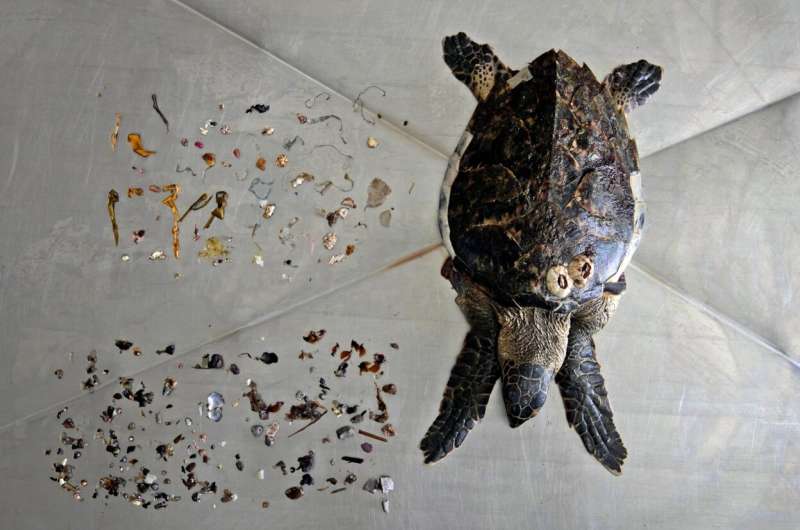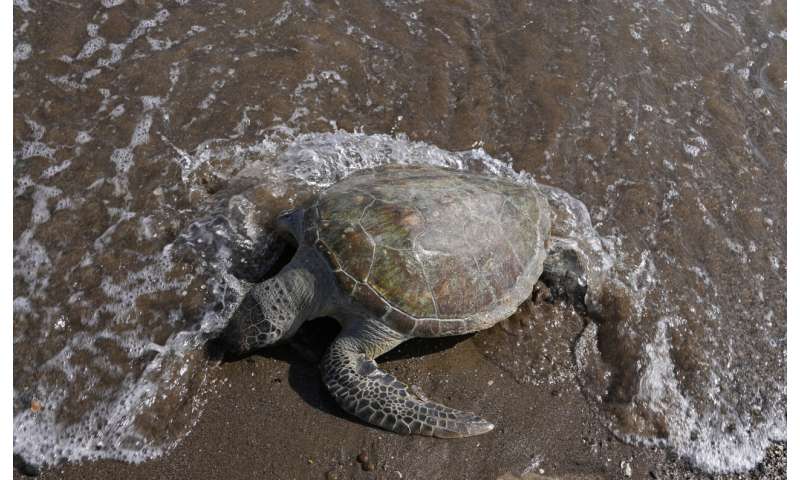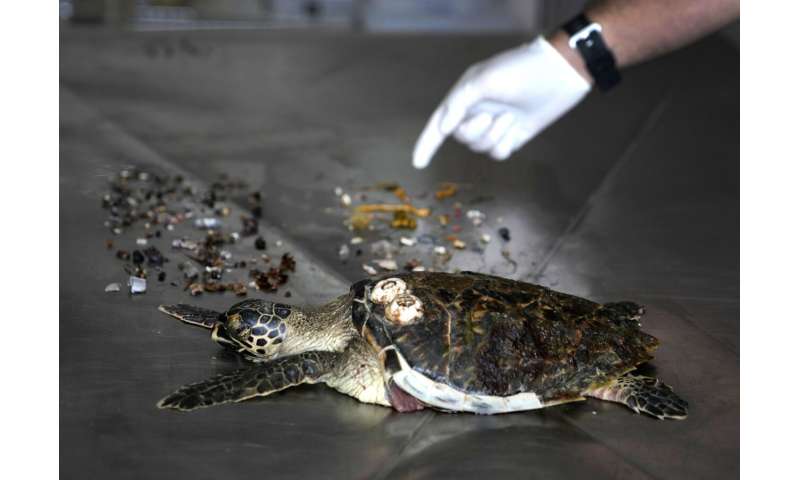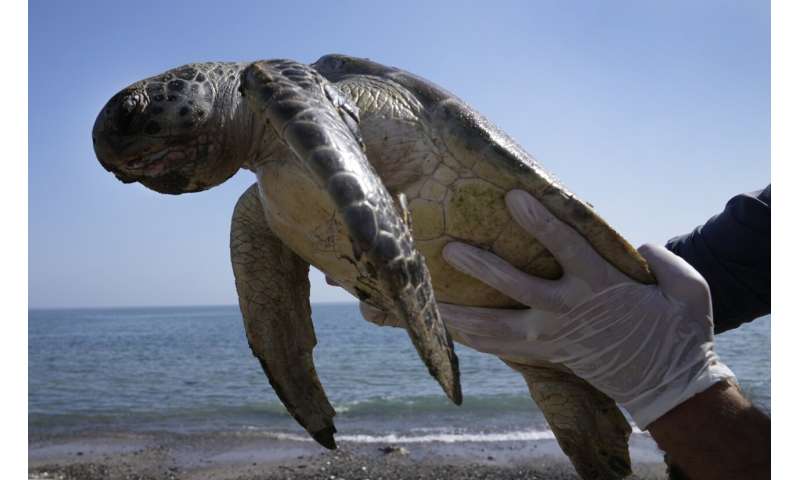How Technolgy Has Changed The Amount Of Pollution In Our Oceans

Plastic pollution at sea is reaching worrying levels and will go along to grow even if significant activity is taken now to terminate such waste material from reaching the world'south oceans, co-ordinate to a review of hundreds of academic studies.
The review past Deutschland's Alfred Wegener Constitute, commissioned by environmental entrada group WWF, examined almost 2,600 research papers on the topic to provide an overview ahead of a United nations meeting afterward this calendar month.
"Nosotros notice it in the deepest bounding main trenches, at the sea surface and in Arctic bounding main water ice," said biologist Melanie Bergmann who co-authored the study, which was published Tuesday.
Some regions—such as the Mediterranean, the E Mainland china and Yellow Seas—already comprise unsafe levels of plastic, while others risk becoming increasingly polluted in the future, information technology establish.
The authors concluded that nigh every species in the ocean has been affected by plastic pollution and that it's harming important ecosystems such as coral reefs and mangroves.
Equally plastic breaks downwards into e'er-smaller pieces it too enters the marine food chain, existence ingested in everything from whales to turtles to tiny plankton.
Getting that plastic out of the water again is about impossible, so policymakers should focus on preventing any more of information technology entering the oceans in the outset place, said Bergmann.
-

A expressionless greenish bounding main turtle washes upwards on the beach in the Khor Kalba Conservation Reserve, in the urban center of Kalba, on the due east coast of the United Arab Emirates, Tuesday, Feb. 1, 2022. A staggering 75% of all expressionless dark-green turtles and 57% of all loggerhead turtles in Sharjah had eaten marine debris, including plastic bags, bottle caps, rope and fishing nets, a new study published in the Marine Pollution Message. The study seeks to document the damage and danger of the throwaway plastic that has surged in apply around the earth and in the UAE, forth with other marine droppings. Credit: AP Photo/Kamran Jebreili -

A Hawksbill sea turtle, that was found on a nearby beach, is displayed after an dissection was performed forth with trash mostly plastic materials, peak, and food items, left, removed from the turtle'south stomach, at the Al Hefaiyah Conservation Center lab, in the urban center of Kalba, on the east coast of the United Arab Emirates, Tuesday, February. 1, 2022. A staggering 75% of all dead green turtles and 57% of all loggerhead turtles in Sharjah had eaten marine debris, including plastic bags, bottle caps, rope and line-fishing nets, a new study published in the Marine Pollution Message. The study seeks to document the harm and danger of the throwaway plastic that has surged in employ around the world and in the UAE, forth with other marine debris. Credit: AP Photo/Kamran Jebreili
Some of the studies showed that fifty-fifty if this were to happen today, the amount of marine microplastic would go on increasing for decades, she said.
Matthew MacLeod, a professor of environmental science at Stockholm University who was not involved in the study, said it appeared to be a sound review of existing studies, focused on the effects of plastic pollution.
"The part that can (and will) be argued almost is whether in that location is enough evidence to warrant aggressive activity (such as what is advocated in this report) that will certainly disrupt electric current practices for plastic production, use and disposal," he said.
MacLeod was involved in a split up study recently that also concluded immediate measures are required because of the possible global impacts.
-

A expressionless green sea turtle is collected from the embankment at the Khor Kalba Conservation Reserve, in the city of Kalba, on the east coast of the United Arab Emirates, Tuesday, February. 1, 2022. A staggering 75% of all dead greenish turtles and 57% of all loggerhead turtles in Sharjah had eaten marine droppings, including plastic numberless, bottle caps, rope and fishing nets, a new report published in the Marine Pollution Bulletin. The written report seeks to certificate the damage and danger of the throwaway plastic that has surged in use around the earth and in the UAE, along with other marine debris. Credit: AP Photo/Kamran Jebreili -

Non food items, mostly plastic material, are shown in containers, that take been establish inside a dead bounding main turtle, at the Al Hefaiyah Conservation Eye lab, in the city of Kalba, on the due east coast of the United Arab Emirates, Tuesday, Feb. 1, 2022. A staggering 75% of all dead green turtles and 57% of all loggerhead turtles in Sharjah had eaten marine debris, including plastic bags, bottle caps, rope and line-fishing nets, a new study published in the Marine Pollution Bulletin. The written report seeks to certificate the impairment and danger of the throwaway plastic that has surged in use around the world and in the UAE, along with other marine droppings. Credit: AP Photograph/Kamran Jebreili
Heike Vesper of WWF said while consumers tin can assist reduce plastic pollution past changing their beliefs, governments have to step up and share the brunt of tackling the problem.
"What we need is a good policy framework," she said, looking ahead to the upcoming U.North. environmental meeting in Nairobi. "It's a global trouble and it needs global solutions."
© 2022 The Associated Press. All rights reserved. This material may not be published, broadcast, rewritten or redistributed without permission.
Citation: Plastic pollution in oceans on track to rise for decades (2022, February 8) retrieved 9 June 2022 from https://phys.org/news/2022-02-plastic-pollution-oceans-rails-decades.html
This document is field of study to copyright. Apart from whatever fair dealing for the purpose of private study or research, no part may be reproduced without the written permission. The content is provided for information purposes but.
Source: https://phys.org/news/2022-02-plastic-pollution-oceans-track-decades.html
Posted by: ballgairciand.blogspot.com

0 Response to "How Technolgy Has Changed The Amount Of Pollution In Our Oceans"
Post a Comment